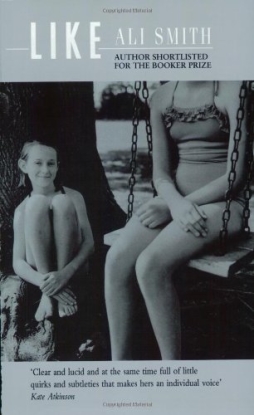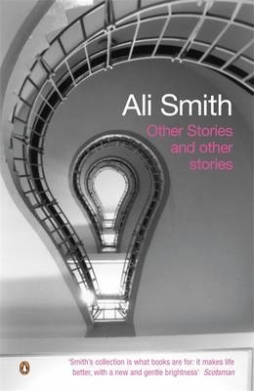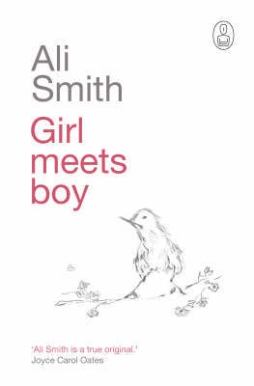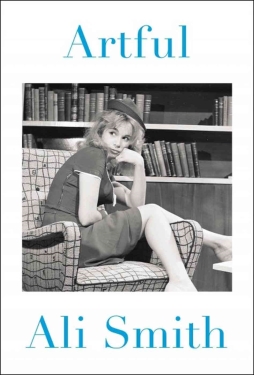A Ghost Put to Good Use: Ali Smith’s Hotel World
 Earlier this week Mark Rigney put up an interesting post on the (narrative) uses of ghosts, and suggested a number of plot and thematic functions a ghost can serve in a story. The post resonated for me with the book I was reading at the time: Ali Smith’s Hotel World. And when I say ‘resonate’ I mean it seemed to echo some of the questions I had about the book, and to suggest some ways of looking at the novel that might help unriddle some of its more curious aspects. So here’s a look at the novel, bearing in mind the question: what’s that ghost doing there?
Earlier this week Mark Rigney put up an interesting post on the (narrative) uses of ghosts, and suggested a number of plot and thematic functions a ghost can serve in a story. The post resonated for me with the book I was reading at the time: Ali Smith’s Hotel World. And when I say ‘resonate’ I mean it seemed to echo some of the questions I had about the book, and to suggest some ways of looking at the novel that might help unriddle some of its more curious aspects. So here’s a look at the novel, bearing in mind the question: what’s that ghost doing there?
Hotel World is Smith’s second novel. Published in 2001, it followed 1997’s Like and two volumes of short stories, Free Love and Other Stories (1995, winner of the Saltire Society Scottish First Book of the Year Award) and 1999’s Other Stories and Other Stories. Hotel World was shortlisted for the Man Booker Prize and the Orange Prize, and won the Scottish Arts Council Book Award. It’s a short novel, made up of five longish interconnected stories and an epilogue. Each of the five main stories follows a woman in a city on the north of the UK; each woman is connected in some way with a certain hotel, a part of the worldwide Global Hotels chain.
The first story is the first-person recollections of one Sara Wilby, ghost. She was a maid in the hotel, who for a joke tried to fit herself into a dumbwaiter on the top floor of the hotel only to have the old dumbwaiter fall and kill her. Her story follows her attempt to understand her death, what happened, and what it means; she succeeds, through a final reconciliation with her former body. The second story follows Else, or Elspeth, a homeless woman who panhandles outside the elegant Global Hotel. She’s given a room for the night by Lise, the night clerk at the hotel, who is the subject of the third story. The fourth story follows a guest, Penny Warner, a newspaper writer working on a puff-piece about Global Hotels. The last of the five stories follows Clare Wilby, Sara’s sister, who, like Sara, is trying to understand Sara’s death. The last section pulls back to give us a wide-angle view of the world and all its connections and ghosts.
 The novel’s stylistically dazzling. Not only is it quick and always clever, weaving multiple themes into into its main images, but the voices of the five characters are distinct and sometimes spectacular, if occasionally so elaborately-conceived as to seem improbable. Clare Wilby’s internal monologue is high modernism in action, something like Molly Bloom in Ulysses, with erratic punctuation and paragraphing. It mirrors Sara’s own relationship with language, as words drift away from her; Sara’s ghost is in the process of forgetting the names of things. The book plays with the importance of words, and the identification of word with the world: each section of the book has a verb tense for a title. Sara’s is simply “Past,” again mirroring the conclusion, “Present” (as well as her sister’s “Future in the Past;” and note the name ‘Wilby,’ ‘will be,’ as well as the way the book compares ‘Sara’ with the French ‘sera,’ ‘will be’).
The novel’s stylistically dazzling. Not only is it quick and always clever, weaving multiple themes into into its main images, but the voices of the five characters are distinct and sometimes spectacular, if occasionally so elaborately-conceived as to seem improbable. Clare Wilby’s internal monologue is high modernism in action, something like Molly Bloom in Ulysses, with erratic punctuation and paragraphing. It mirrors Sara’s own relationship with language, as words drift away from her; Sara’s ghost is in the process of forgetting the names of things. The book plays with the importance of words, and the identification of word with the world: each section of the book has a verb tense for a title. Sara’s is simply “Past,” again mirroring the conclusion, “Present” (as well as her sister’s “Future in the Past;” and note the name ‘Wilby,’ ‘will be,’ as well as the way the book compares ‘Sara’ with the French ‘sera,’ ‘will be’).
So the use of a ghost as a narrator lets the book begin by drawing attention to its use of language. It also helps point up the structure of the novel: Sara’s tale seems to wrap around the Else-Lise-Penny sequence at the book’s heart, with Sara, Clare, and the epilogue seeming at first to act as a kind of heavy parenthesis. But the fact is Sara’s story (and Clarte’s resulting actions) helps link the three other women together, as well. The ghost draws the living together.
Still, there does seem to be a division between the two ‘cycles’ of the book, reflected in a thematic division. The three stories at the core of the book explicitly have to do with class, and with the hierarchies of the world: the low-to-middle-to-upper class contrasts of the three lead characters, their different views of money — indeed, the way coins become a symbol that echo through the book — and the way they relate to the hotel. Which itself, the Global Hotel, is an image of the world at large. Into which people arrive; and from which they check out.
 Even incidentally we get the idea that the hotel’s all about class. Here’s Sara, early in the book, preparing to describe her death:
Even incidentally we get the idea that the hotel’s all about class. Here’s Sara, early in the book, preparing to describe her death:
This is how it ended. I climbed into the, the. The lift for dishes, very small room waiting suspended above a shaft of nothing, I forget the word, it has its own name. Its walls, ceiling, and floor were all silver-coloured metal. We were on the top floor, the third; it used to be the servants’ quarters two hundred years ago when the house had servants in it, and after that the house was a brothel and up there was where the cheap girls, the more diseased or aging girls, were put to sell their wares, and now that it’s a hotel and each room costs money every night the smaller rooms still cost a little less because the ceilings are closer to touching their floors up at the top of the house
So the place where Sara died used to be servants’ quarters; the hotel used to be a brothel, a place defined by the selling of flesh. The dumbwaiter in which Sara died was “silver-coloured,” again calling to mind money and wealth. And now as a hotel “each room costs money every night.” So the whole existence of the building, the presence of anyone in any room, is defined economically. Later, Sara will visit her body in the grave, which is described as a “wooden room, smooth and costly on the outside, chipboard-cheap at the centre.” Later still, Lise will give Else a room overnight: it’s cold, and Lise can hear the beggarwoman coughing, and her own sense of humanity leads her to give Else shelter. As it happens, Lise’s good intentions will also lead to another woman being unjustly fired, but that’s irony for you.
 But if the Global Hotel seems inherently ironic, there’s something touching about Sara and Clare. Their stories are about family, about love, about the importance of life: “Remember you must live,” Sara tries to tell people, which her increasing difficulties with language alters to “Remember you must leave” and then “remember you most love” and even “remember you mist leaf” — again playing with symbols, with the image of a tree, in leaf when Sara died in summer and bare-branched during the winter when the core of the action takes place.
But if the Global Hotel seems inherently ironic, there’s something touching about Sara and Clare. Their stories are about family, about love, about the importance of life: “Remember you must live,” Sara tries to tell people, which her increasing difficulties with language alters to “Remember you must leave” and then “remember you most love” and even “remember you mist leaf” — again playing with symbols, with the image of a tree, in leaf when Sara died in summer and bare-branched during the winter when the core of the action takes place.
The other women have varying relations to language: Penny is a writer, but a commercial writer, working with the bland vocabulary of the adman. When she makes a mistake, she deletes it; her titular tense is ‘Perfect,’ but that perfection is limiting. Else drops vowels from her appeals for money — “Spr sm chn? Thnk y.” — but she herself is ironically aware this is also potentially a skill, a secretarial shorthand. Her shoes are insulated with newspapers trying to describe the growing inequality in Britain, language inadequate to describe but oddly potent, after a fashion, to help. Lise ultimately gets sick working at the Global, and becomes unable to command words, to fill out forms describing her disability: she looks at the blanks in the forms, and imagines the questions surrounding them as a kind of poetry, even while her own mother sees her as the subject of a poem.
Against all of this perhaps Sara’s ghostliness represents a kind of shock of creation. Sara’s ghost has an almost euphoric sense to her. One of the book’s epigraphs is from William Blake, “Energy is eternal delight,” and perhaps the ghost is pure energy, unanchored by flesh, uninhibited. She is an energy rising through and out of language, losing language as she loses memory, losing words as she loses the world.
 Overall Sara and Clare seem to be concerned with what is not to be found at the Global: love, family, friendship. Their bond helps unite the novel, and in a sense to inspire it: Sara’s death, and her ghost’s story, echoes through the book just as Clare’s appearance ties together the stories of the other three women — her actions in the hotel, uncovering the covered-over dumbwaiter shaft through which Sara fell, brings the other three women together. Clare, whose story is titled “The Future in the Past,” remembers Sara; she maintains the memory Sara’s losing, though her language is a stream-of-consciousness without Penny’s precise grammatical boundaries.
Overall Sara and Clare seem to be concerned with what is not to be found at the Global: love, family, friendship. Their bond helps unite the novel, and in a sense to inspire it: Sara’s death, and her ghost’s story, echoes through the book just as Clare’s appearance ties together the stories of the other three women — her actions in the hotel, uncovering the covered-over dumbwaiter shaft through which Sara fell, brings the other three women together. Clare, whose story is titled “The Future in the Past,” remembers Sara; she maintains the memory Sara’s losing, though her language is a stream-of-consciousness without Penny’s precise grammatical boundaries.
On the other hand, Sara and Clare are both deeply concerned with time. Sara wonders about the amount of time it took her body to fall down the dumbwaiter shaft, which is, in the end, what Clare tries to find out for her (as it seems Sara has asked her to find out, a kind of quest given Hamlet-like from beyond the grave). Sara, as a competitive swimmer, was concerned with the time it took her to move through water during her races; and, most crucially, experienced a romantic awakening when she met a young woman working in a clockmaker’s shop where Sara took her watch to be fixed. Now Sara’s ghost regrets the time that passed unmarked while she was alive:
I worry endlessly at detail that would never have concerned me, not even for a moment of when I was still alive. For example, just for peace of mind, my fall. I would like very much to know how long it took, how long exactly, and I’d do it again in a minute given the chance, the gift of a chance, the chance of a living minute, sixty whole seconds, so many.
The ghost reminds us, here as elsewhere, of the value of life. Just as the ghost’s existence reminds us of death; I think the way the hotel covers over the dumbwaiter shaft where Sara died is a symbol of the repression of the awareness of the inevitable end, therefore a banalisation of life. Clare’s uncovering the shaft to learn a little bit of the truth of Sara’s death is perhaps, in a way, a making peace with the dead, and with death as a whole. An achnowledgement of what lurks within the walls of the world.
 So Sara’s story is a reminder of the final levelling waiting for all of us, just as the ghosts in the final chapter (including Dusty Springfield and Princess Diana) are a kind of danse macabre: the class distinctions that seem to mean so much in life can’t buy off death. Everybody dies, and in truth everyone in the world or perhaps even out of it is connected to everyone else. You can try to plaster over that knowledge, you can cover it up behind a screen of language, but it won’t alter the inevitable working-out of time.
So Sara’s story is a reminder of the final levelling waiting for all of us, just as the ghosts in the final chapter (including Dusty Springfield and Princess Diana) are a kind of danse macabre: the class distinctions that seem to mean so much in life can’t buy off death. Everybody dies, and in truth everyone in the world or perhaps even out of it is connected to everyone else. You can try to plaster over that knowledge, you can cover it up behind a screen of language, but it won’t alter the inevitable working-out of time.
Sara’s death and her ghost are central to the structure of Smith’s book. They drive what slender plot there is, and help bring the various characters together. But thematically I think Sara, the ghost behind the scenes, is crucial; and crucial as all truly important symbolic elements are crucial to a book — you can’t nail down one single symbolic purpose that they serve, because a symbol has more than one purpose, has perhaps a potentially infinite number of purposes. A symbol, a ghost, shifts significance with each reading.
Some readers have spoken of Hotel World as an antinovel, lacking plot and questioning language and depicting character in unusual ways. From that perspective, having the first and perhaps most significant of its characters being dead is another facet of the book’s challenge to literary convention. Sara seems to play with the need for a story — “Here’s the story; it starts at the end,” she says on the first page, which her body, resignedly filling in her ghost’s missing memories, echoes: “here’s the story, since you’re so desperate for one.” Clare speculates that death is like a book that goes blank, except then from another perspective it goes on “& it’s all right to be relieved that it did because actually it’s okay that it did that it does it’s even good”. Life and language may not be the same but there’s a link, a ghostly link. Smith’s challenging ideas of both, and using the imagery of the fantastic for her purposes. What else does a writer do with an image, but make it a meaningful symbol?
Matthew David Surridge is the author of “The Word of Azrael,” from Black Gate 14. His ongoing web serial is The Fell Gard Codices. You can find him on facebook, or follow his Twitter account, Fell_Gard.